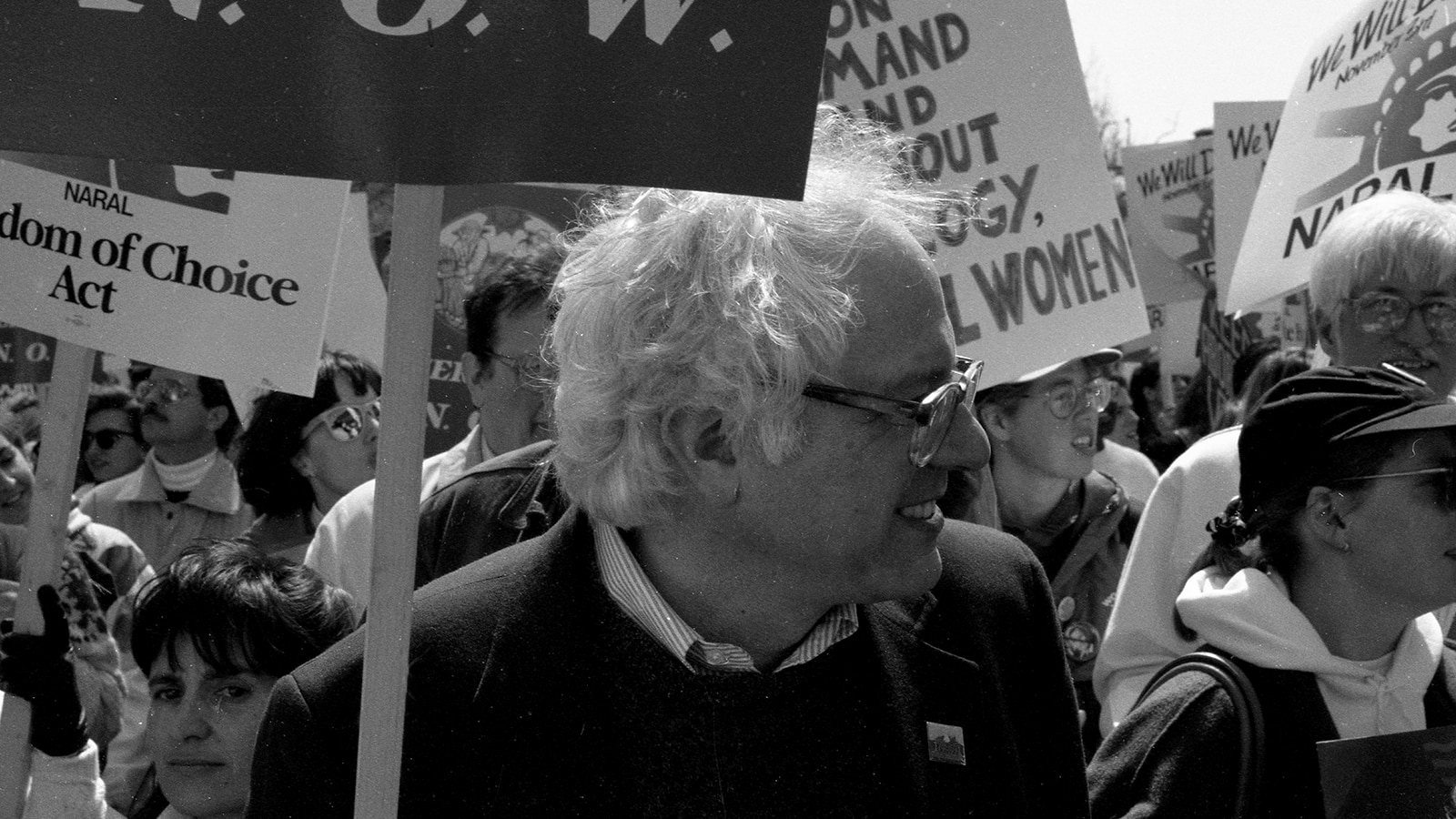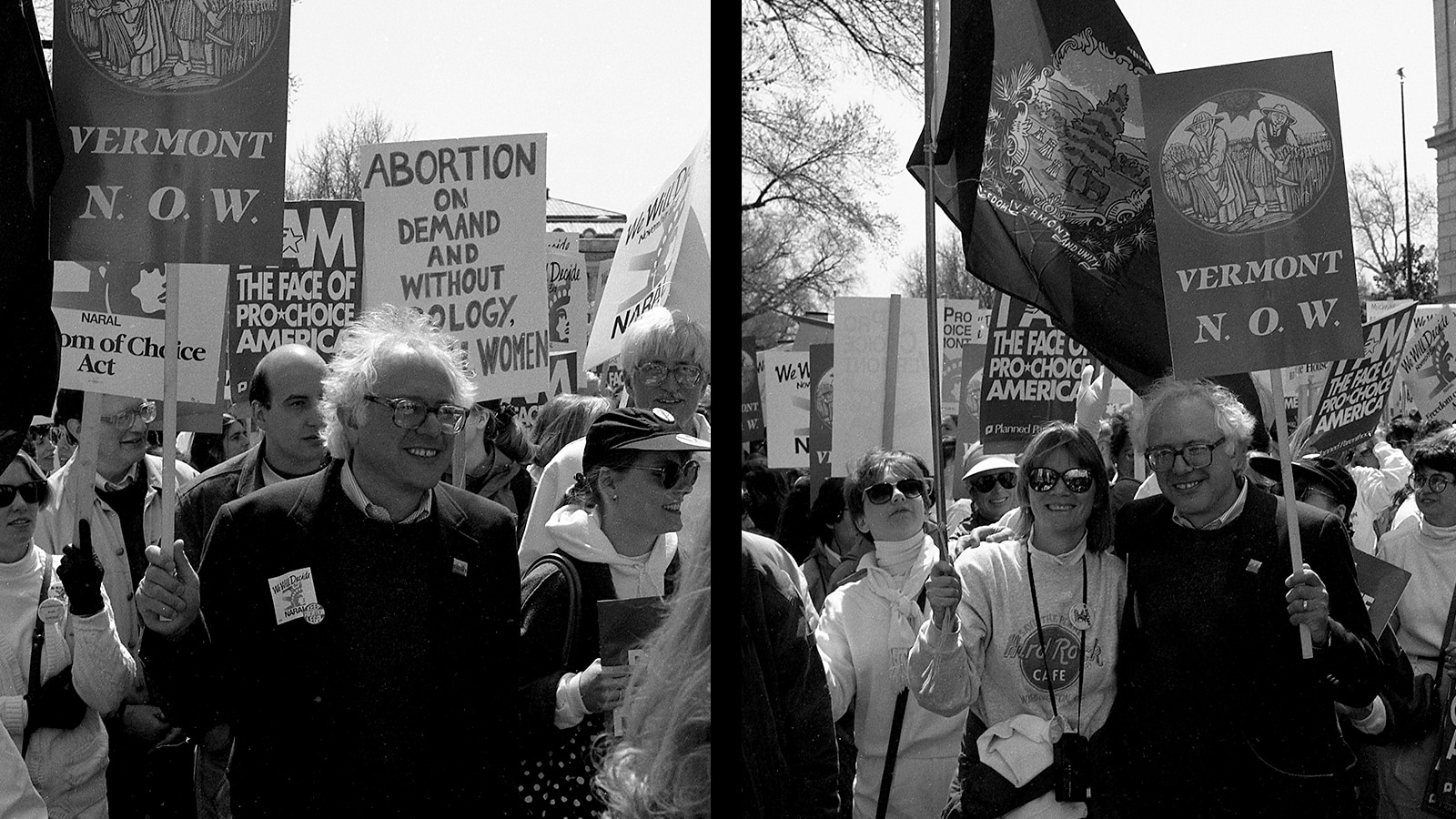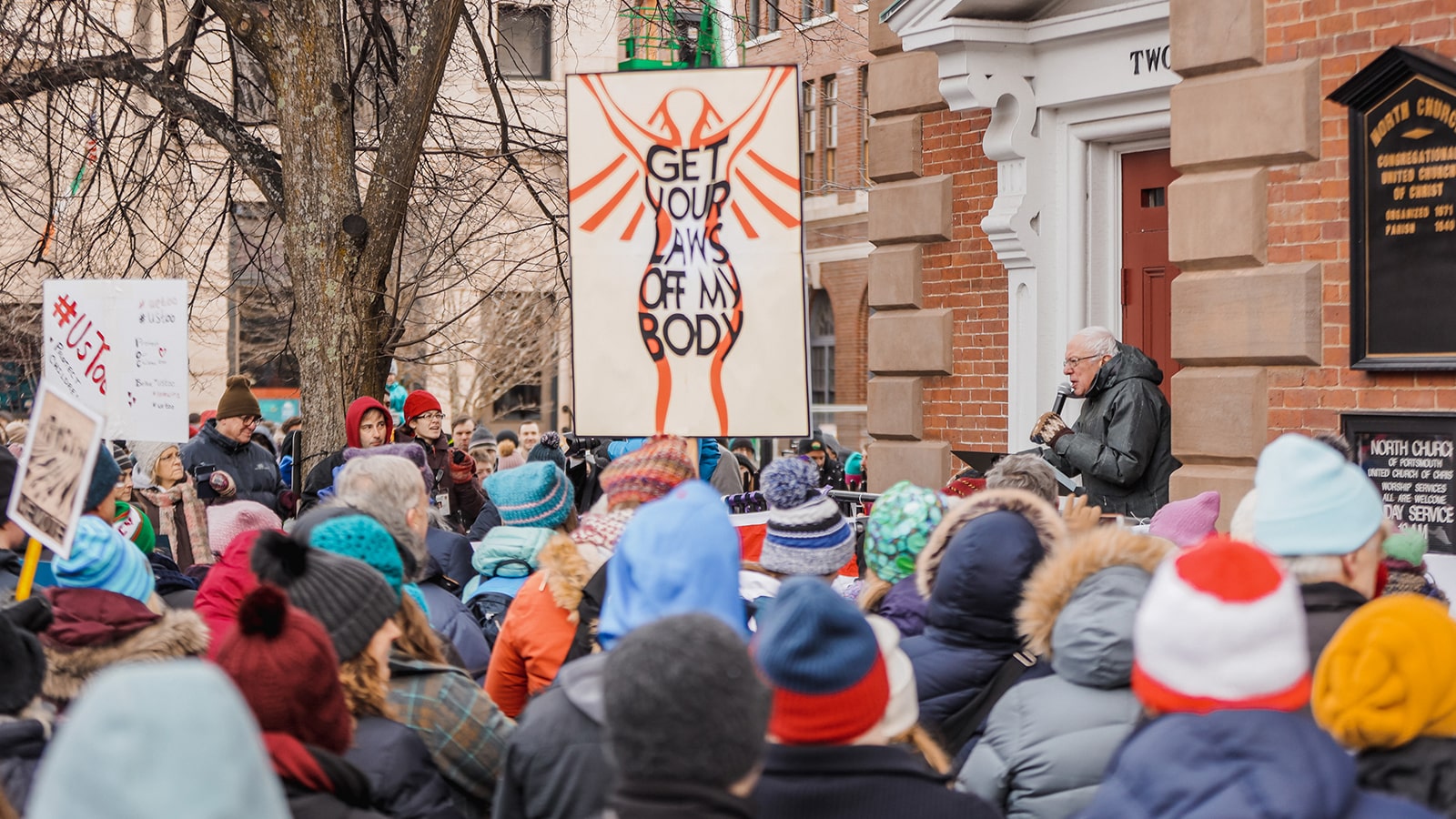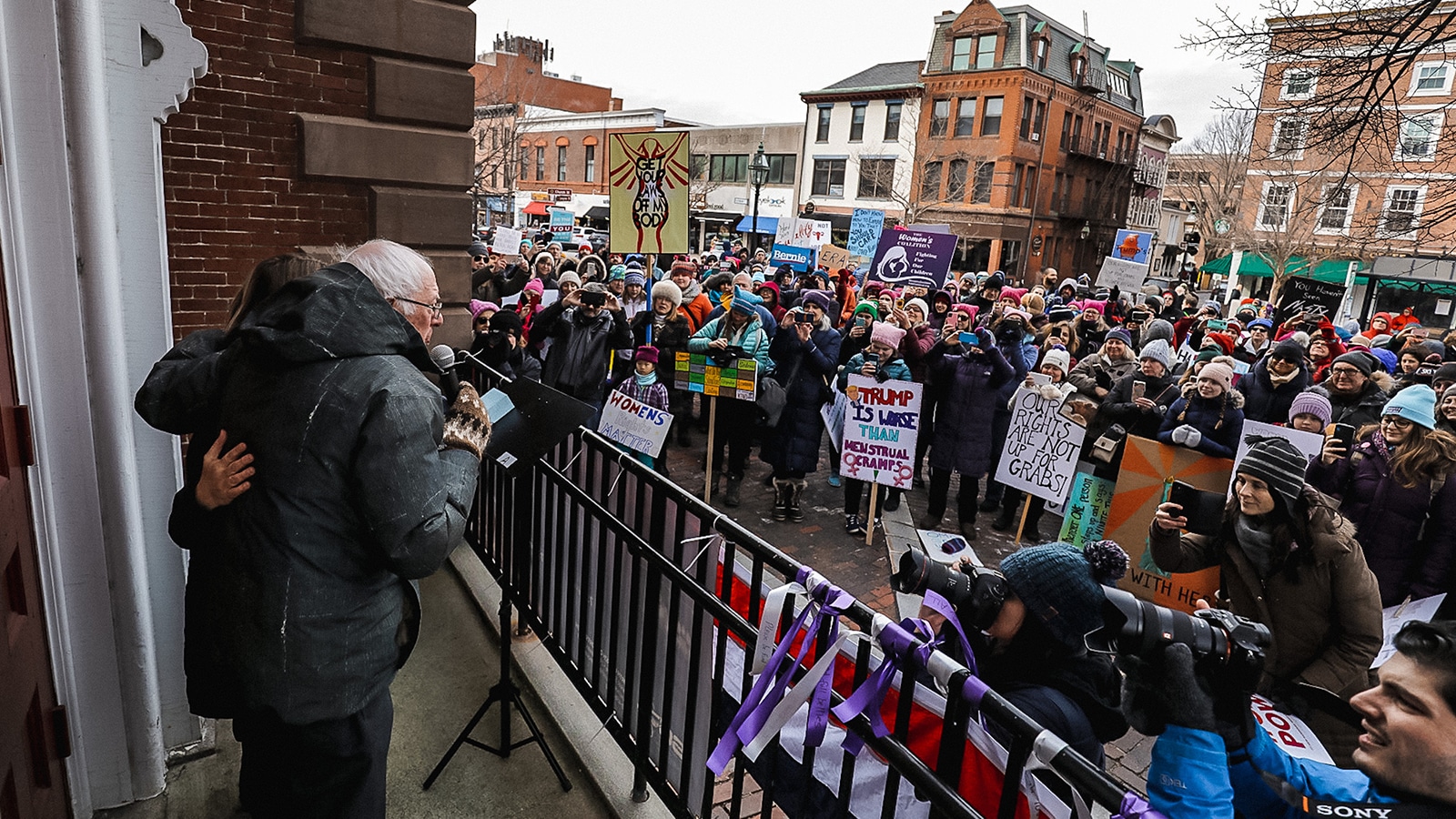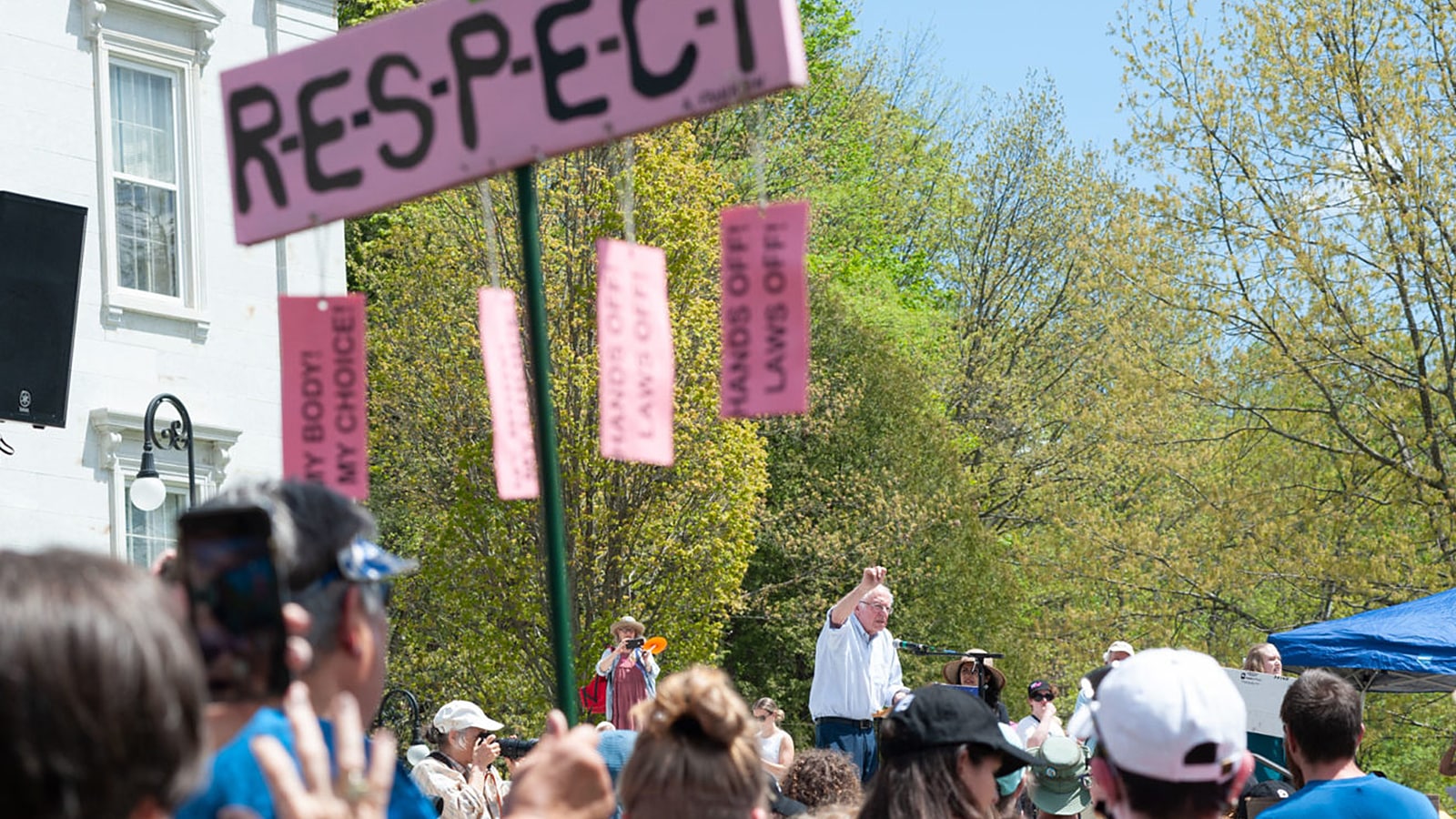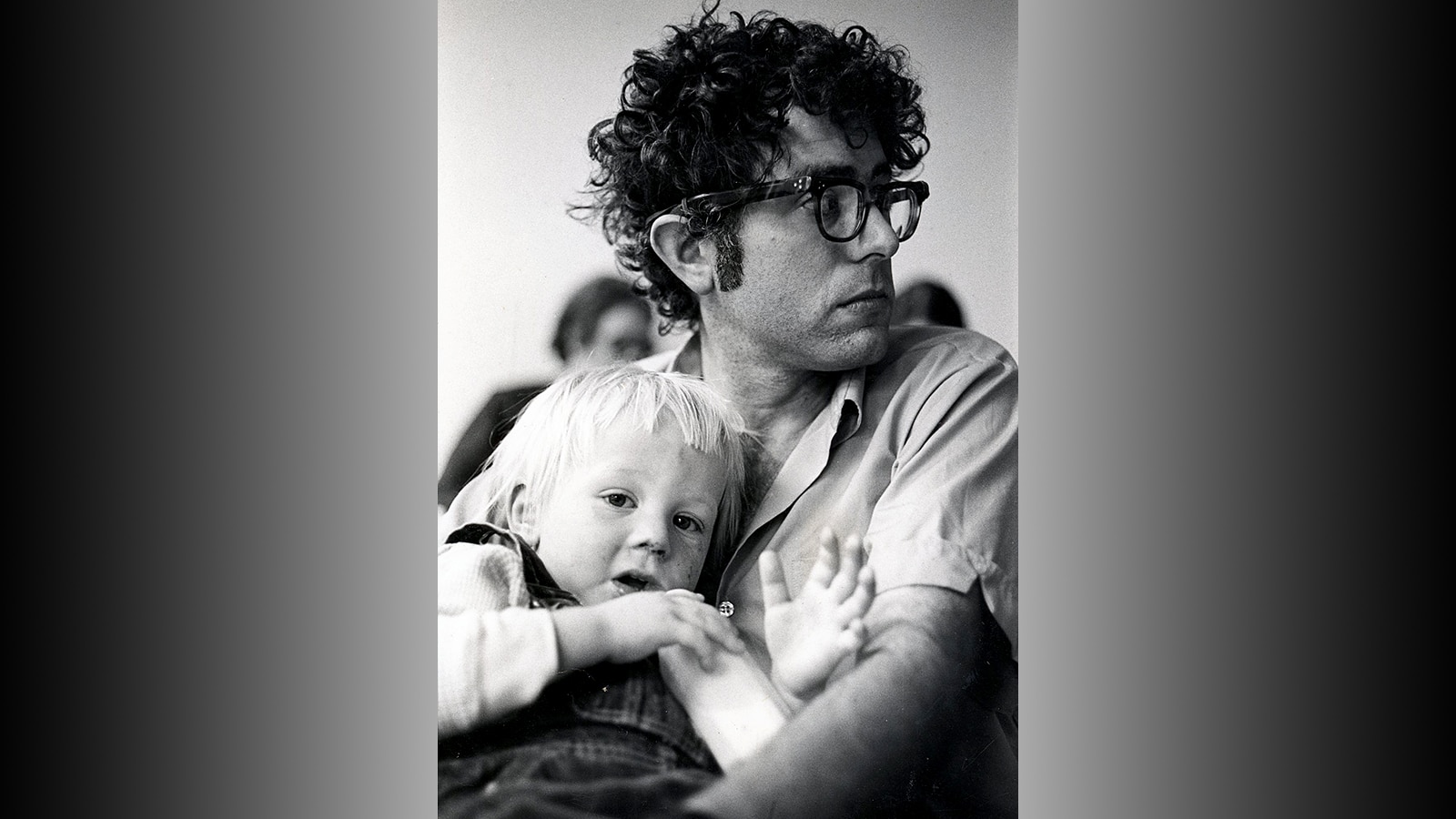In the months preceding the 1972 U.S. Supreme Court ruling on Roe v. Wade, Bernie Sanders, the Liberty Union candidate for Governor, expressed his views on abortion rights. He stated that if elected Governor, he would urge the legislature to take abortion out of government jurisdiction and make it a matter of individual conscience. According to U.S. surveys, this was a highly unpopular view at the time.[1]
“It strikes me as incredible that politicians think they have the right to tell a woman what she can or cannot do with her body,” said Sanders. “This is especially true in Vermont where we have a legislature which is almost completely dominated by men.”[1]
He continued to advocate for reproductive rights as a Congressman, co-sponsoring the 1992 “Freedom of Choice Act” and marching alongside fellow Vermonters in a Washington, D.C. pro-choice rally. The march, held in opposition to the Bush administration’s attempts to curtail abortion rights, came three weeks before the Supreme Court heard arguments on a case that would potentially restrict or overturn legalized abortion.[2]
“I am outraged that the President of the United States believes he is entitled to take away a woman’s right to control her own body,” Sanders said. “We must send President Bush a message: we will not go back to the dark days when abortions were performed in back alleys. Freedom means the rights of a woman, whatever race, income level, or status, to have decent health care, including full knowledge of the options available to them during pregnancy and full control of their bodies. We will accept no less.”[2]
Rep. Sanders also supported H.R. 796, the “Freedom of Access to Clinic Entrances Act of 1993,” which would prohibit the use or threat of force to obstruct access to a clinic providing abortions. The bill expressly stated that its provisions do not limit peaceful picketing, demonstrations, or any other act of expression protected by the First Amendment.[3]
While serving in Congress, Sanders maintained a 100 percent voting record scorecard for his support of women’s reproductive rights and civil liberties issues. His perfect voting scores came from three prominent women’s and civil rights organizations: the Business and Professional Women’s USA Organization, the Hollywood Women’s Political Caucus, and the American Civil Liberties Union (ACLU).[4]
The Business and Professional Women/USA, a bi-partisan organization of 100,000 members dedicated to equity and economic self-sufficiency for working women, gave Sanders a 100 percent rating for his votes supporting family and medical leave and civil rights issues.[4]
The ACLU evaluated 12 key issues and found that Sanders voted to support civil liberties in each case. And the Hollywood Women’s Political Caucus placed Sanders on its Pro-Choice Honor Roll for his perfect score. That organization rates representatives on their voting records in support of pro-choice and reproductive freedom legislation. Its ratings were based on 13 votes, including votes on the abortion gag rule and Medicaid funding.[4]
“Civil liberties and reproductive rights go to the very core of freedom in a democratic society,” Sanders said. “I am extremely proud of my record in Congress and longstanding commitment to fighting for all who rely on the historic Bill of Rights to protect their civil liberties. Today, when these rights, and especially the rights of women, are increasingly under attack, I intend to remain vigilant and do everything I can to protect reproductive rights, freedom of speech, and the other basic freedoms on which this great nation was founded.”[4]
In 1992, on the 20th Anniversary of Roe vs. Wade, Rep. Sanders reaffirmed his support for a woman’s right to choose. He congratulated the Clinton administration for its quick action to reverse the Reagan Bush-era actions, which had limited women’s rights to abortion and medical progress.[5]
“I realize that abortion is a contentious and controversial issue on which many people have deeply held personal beliefs,” Sanders said. *’But I feel strongly that in the final analysis, the issue of abortion must be decided by the woman herself and that the government should stay out of the decision.”[5]
The Clinton administration’s actions supported by Sanders included:
- Repeal of the gag rule, which prohibits public family planning clinics from giving out information about abortion.
- Eliminating the ban on the medical use of fetal tissue, which is important in treating Parkinson’s disease and other illnesses.
- Eliminating the ban on abortions for military personnel in military hospitals overseas.
Sanders also supported lifting the ban on importing the drug RU-486, used for abortion and contraception, in many countries. The Clinton administration had promised to ask the Food and Drug Administration to review the ban.[5]
“Although the past two administrations were unable to eliminate freedom of choice completely, they did restrict women’s access to accurate information and safe medical treatment,” said Sanders. “I applaud the Clinton administration for acting swiftly to remove these restrictions.”[5]
In March of 1997, Sanders voted in opposition to HR 1122, the “Abortion Ban.” He joined numerous medical and women’s organizations in opposition to the bill, including the American College of Obstetricians and Gynecologists, the American Public Health Association, the American Nurses Association, the American Medical Women’s Association, the Society of Physicians for Reproductive Choice, and Health, the National Organization for Women, and Planned Parenthood. The bill passed the House by 295 to 136.[6]
Sanders said that it is wrong for the federal government to deny options to women and their physicians:
“The decision to have an abortion is never an easy one for any woman. Each woman’s situation is unique, and each woman must consider different and complex factors – particularly in terms of her own medical situation. It is not the government’s place to deny a physician and his or her patient options that will protect that patient’s health.” He concluded that “The Supreme Court has ruled that states cannot ban abortions necessary to preserve the life or health of the mother. But this bill would prevent doctors from doing all they can to promote and protect the health and safety of their patients.”[6]
In June 2022, the U.S. Supreme Court revised its decision on Roe Vs. Wade, against the wishes of the majority of the U.S. population. This act has spurred abortion rights supporters and opponents into action, speeding up their efforts to protect or remove access to abortion.[7]
As of this writing, the fight moves to the states, where so-called trigger laws have already banned nearly all abortions in a handful of states. More will likely take effect soon.[7]
“Half of [the states] are going to have quite restrictive abortion laws, and about half will pretty much maintain the status quo,” says Ron Allen, J.D., a constitutional law expert, and professor of law at Northwestern University. “My guess is, the largest population will be in those states that maintain the status quo, [though] that’s not terribly consoling to somebody in Arkansas, [which has a trigger law.].”
Federal and state officials spoke out quickly about what protections are still in place for access to abortion, and some governors have taken new actions to expand that protection.
Senator Sanders has continued to relentlessly maintain his stance in the post-Roe v Wade fight:
The Women’s Health Protection Act would prohibit government restrictions on access to abortion services. Sen. Bernie Sanders (I-Vt) tweeted: “Democrats must now end the filibuster in the Senate, codify Roe v. Wade, and once again make abortion legal and safe.”[7]
 Back to Timeline
Back to Timeline
